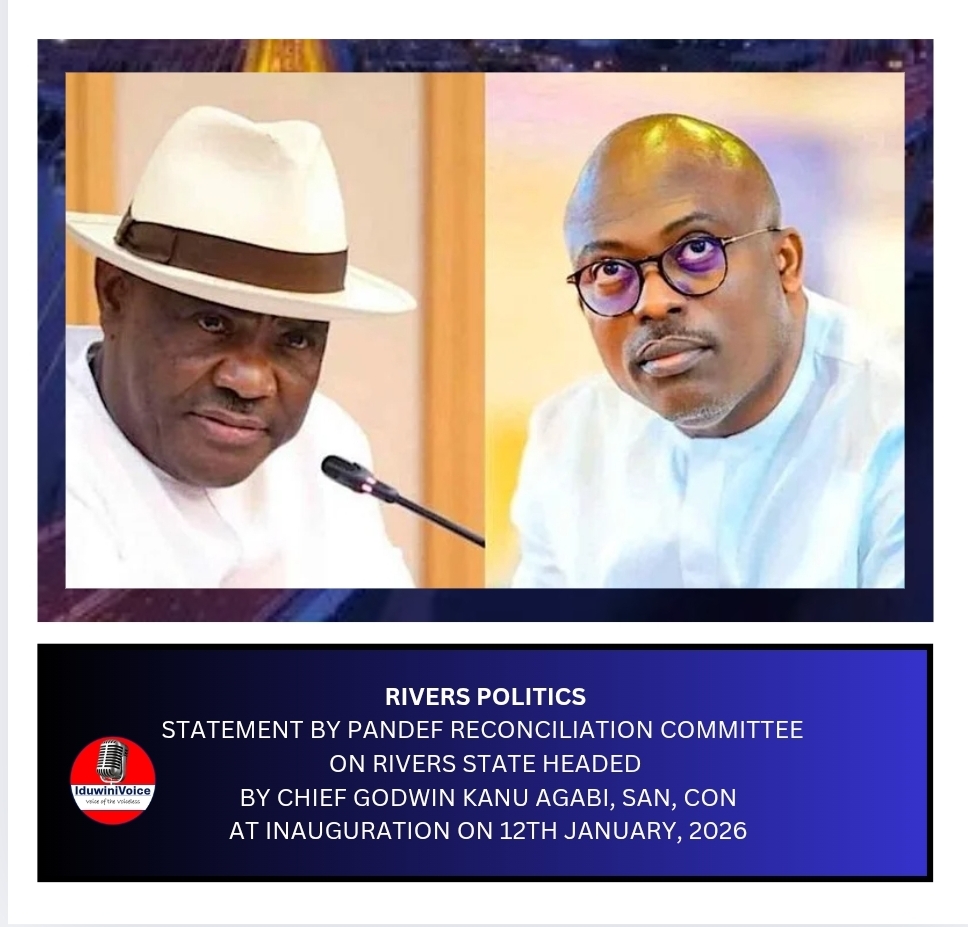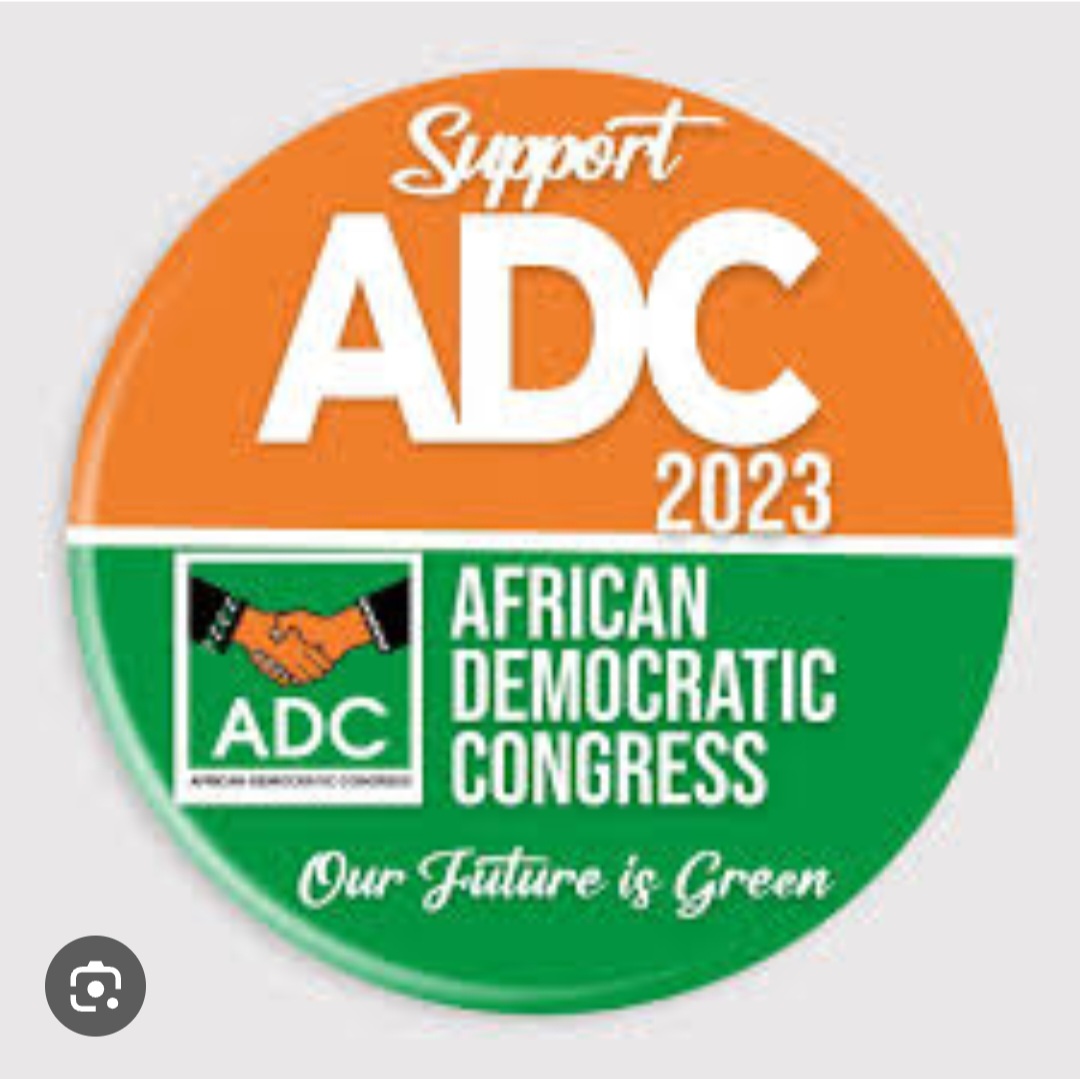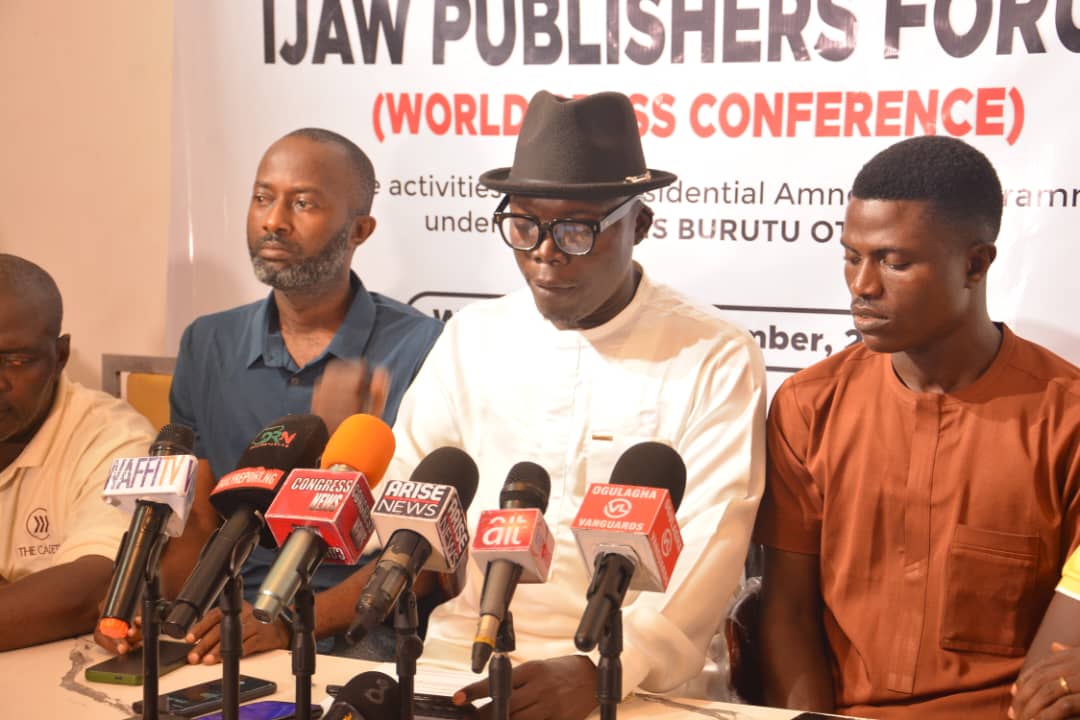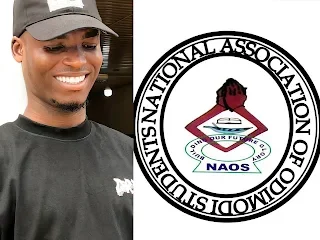Press Release
PRESS RELEASE: Western Zone 2024 ZECO Releases Delegates List Ahead Of Zonal Election At Odimodi
Being Text of Press Statement Made by the Zonal Electoral Committee (ZECO), Ijaw Youths Council, May 2024.
1. The Zonal Electoral Committee (ZECO) of the Western Zone, 2024, having collated lists of delegates from all 24 (twenty-four) clans in the zone, which to notify the public, especially aspirants for the forth- coming Western Zone elections, that the attached names from the various clans are the only delegates eligible to vote at the congress in Odimodi on the 4th and 5th June, 2024.
2. Transportation has been provided for all delegates as follows; Take off point: King Couple Water Front, NPA Old Port Warri Take off time: 11 am
3. Accreditation Of Delegates: 7 Delegates shall be done at the waterfront before the boat departs for Odimodi, as such, delegates are expected to come with a valid ID card, Voters Card, or National Identity Card for proper identification.
4.We wish everyone journey mercies to and fro their destinations.
5. Godbless Ijaw Nation!.
IJAW YOUTH COUNCIL
WESTERN ZONE (DELTA, EDO & ONDO)
ZONAL ELECTORAL COMMITTEE (ZECO) 2024.
LIST OF DELEGATES
S/N NAMES SEX CLAN REMARK
1 Okaba Godwin Dortimiyerin M Akugbene-mein
2 Ambrose Francis M Akugbene-mein
3 Godfrey Rebecca F Akugbene-mein
4 Osere Michaiah M Apoi
5 Egbukuyomi Femi M Apoi
6 Tiwo Nike F Apoi
7 Arigi Toibokumoh M Arogbo
8 Oyinbo J. Timibra M Arogbo
9 Loko Ebiwaisinghan F Arogbo
10 Esegha Morris Werinina M Diebiri
11 Bod Enduran Igetei M Diebiri
12 Ruth Awese F Diebiri
13 Lawoni Dumofaye M Egbema
14 Okpoye Aaron M Egbema
15 Nasco Peace F Egbema
16 Brown Tonbra Evans M Furupagha
17 Bekewei Dighitoru Muji M Furupagha
18 Miye Onadigha Magret F Furupagha
19 Oyinkuro Wazo Zikurebai M Gbaramatu
20 Peredise Sonya Afiyagba F Gbaramatu
21 Tracy Lawei Edolo F Gbaramatu
22 Gbanawei Diyepriye M Gbaraun
23 Joshua S. Kimiyai M Gbaraun
24 Okorodide Ebizi F Gbaraun
25 Ingbesekumo Oyas David M Iduwini
26 Ferebo Ebi Iyadonwan M Iduwini
27 Akpoboloukemi Tamaramiensine F Iduwini
28 Igane Martins M Isaba
29 Timoko Wisdom D. M Isaba
30 Stella Wareseimere F Isaba
31 Titity Ebitimi M Kabowei
32 Asaba Stephen M Kabowei
33 Ogbotobo Blessing Tare-ere F Kabowei
34 Oyinbonugha Ernest Owutuamor M Kumbowei
35 Lawani Eniye Christopher M Kumbowei
36 Mark Ebiere F Kumbowei
37 Seleke-owei Dubasuode M Ngbilebiri-mein
38 Boss E. Kenere M Ngbilebiri-mein
39 Niekebi Nursere Tina F Ngbilebiri-mein
40 Christopher Perezimo Akontua M Obotebe
41 Romeo Okoye M Obotebe
42 Joy Bukuwei F Obotebe
43 Moses Omare M Ogbe-Ijoh
44 Donye Vincent M Ogbe-Ijoh
45 Lucy Church-ere Oromoni F Ogbe-Ijoh
46 Asheta Terry M Ogbolubiri
47 Godspower Salo M Ogbolubiri
48 Ebikonboere Commander F Ogbolubiri
49 Louis K. Ogori M Ogulagha
50 Potoki Godspower M Ogulagha
51 Oladipupo Deborah Seyi F Ogulagha
52 Simongha Perekeme Ernest M Okomu
53 Atele Siletoboulagha M Okomu
54 Christopher Fiyesinkumo Peace M Okomu
55 Michael Kekegha M Olodiama
56 Bright T. Kalayolo M Olodiama
57 Ebipate Pamela Uffor F Olodiama
58 Azamaziba Y. Elvis M Oporomo
59 Pullah Kelvin T. M Oporomo
60 Ebiaswode Iabella Gbafade F Oporomo
61 Emomotimi Eseoru M Seimbiri
62 Terry Brown M Seimbiri
63 Jessey Laye Angel F Seimbiri
64 Andy Dinini Macauley M Tarakiri
65 Peretubo Sunny Ade M Tarakiri
66 Etemo Becky F Tarakiri
67 Tam Pereotubo M Tuomo
68 Ogah Semes Lucky M Tuomo
69 Yerindideke Justina F Tuomo
70 Ebitimi Ekisah M Zadobiri
71 Oloye Dauzide M Zadobiri
72 Funlayefa Asiama F Zadobiri
Press Release
STATEMENT BY PANDEF RECONCILIATION COMMITTEE ON RIVERS STATE HEADED BY CHIEF GODWIN KANU AGABI, SAN, CON AT INAUGURATION ON 12TH JANUARY, 2026

IduwiniVoice
It is our privilege to serve on this Committee. For this privilege we are grateful to God and to His Excellency, Ambassador Godknows Igali, Chairman of the Board of Trustees of PANDEF and the other respected members of the Board of Trustees. I single out for particular mention His Royal Majesty, King Alfred Papapraye Diete Spiff, the former Governor of Rivers State and the Amayanabo of Twon Brass in Bayelsa State. He is a man whose commitment to the South-South and the nation as a whole has never been in doubt. He goes down in history as the first governor of Rivers State when that state included Bayelsa State. It is the sacrifices of men like him that bequeathed the States of the South-South to the people of that area. The duty of respect that we owe to a man like that demands that we take his intervention seriously.
We are appointed to explore ways of bringing the escalating political crisis in Rivers State to an end. This crisis has persisted for too long. If it continues any further, it will call into question the commitment of the parties involved to the interest of the people of Rivers State and of the nation that is compelled to share in the pains and anxieties of that State.
We cannot afford to stand by and do nothing or pass by on the other side as Rivers state, a state whose talents and resources have blessed and continue to bless the nation struggles with issues of political power. Let the parties involved not be as the Clam and the Oyster which left their abode in the depths of the sea and came to the sea shore to fight. They went on fighting even when they saw the fisherman coming. The fisherman picked them up, took them home and made a nice fine meal of Clam and Oyster. May it not be with Rivers State as it was with the Clam and the Oyster.
We trust that the Lord will touch the hearts of those to whom we address our appeal for peace and reconciliation. It is our firm conviction that this matter can be resolved amicably. That conviction is rooted in the fact that the parties to this dispute are one people who began as one. They played significant roles in assisting one another to the various offices that they hold now. If they have now offended one another, they must be humble enough to apologize and to forgive. It is in forgiving that true greatness can be found.
The resolution of this matter is something that the parties can handle themselves without the intervention of third parties. They must be willing to go the extra mile with one another, to turn the other cheek and to pray for one another. Let them not dismiss this as weak or sentimental as we often do when the name of the Lord is mentioned in politics or economics. The misconception that God has no place in our politics has harmed and continues to harm the nation. Whether we are governors or ministers or legislators, whoever we are, it is to God that we owe our appointments and promotions. Whether we are servants or slaves it is the Lord that we serve. And it is to him that we shall, in the end, render account. We urge the parties to proceed with caution. We urge them to make allowance for error. We appeal to them to proceed with a prayer for forgiveness just in case they may be wrong.
The Minister, His Excellency, Nyesom Wike, is my friend. He is my benefactor. He is a man I love. He is a man I respect. I bear witness to his courage and patriotism. The work he did as Governor of Rivers State and the work he is doing as Minister of the FCT have since immortalized him. The mighty hand of God is upon him. That great Hand demands that he should lead this reconciliation. I say the same thing about His Excellency Governor Fubara. I happen to have been a member of the team that defended the petition that arose from his election as governor. That is my bond with him. I trust him to respect that bond.
In a nation as diverse as ours, discordant voices will be heard from time to time. In the midst of those discordant voices, the President can be trusted to recognize the clear ring of truth when he hears it. That is the whole essence of the Presidential system in vesting the President with all executive power which he is trusted to exercise in order to calm the nation down.
We have great respect for the members of the House of Assembly of Rivers State and we have no doubt whatsoever that their motives are genuine and patriotic. We pray for a change of heart on their part. It is in forgiving the Governor whatever wrongs he has committed that they will demonstrate their restraint, their public spirit and their maturity.
This Committee is not appointed to sit in judgment over the parties. We have no competence to do so. Our duty is to appeal to the parties to be reconciled with one to another, and we now do so. We appeal to the parties to embrace reconciliation. We urge them, we beg them, we appeal to them. Sacrifices are called for. Make them and let there be peace.
Press Release
PRESS RELEASE: ADC Rivers State Women Call for Stronger Political Inclusion at 2025 Diaspora Strategic Women Convergence

Rivers State, Nigeria — Women leaders of the African Democratic Congress (ADC), Rivers State Chapter, have called for increased political inclusion, unity, and strategic participation of women in governance following their participation in the ADC Diaspora National Leader and Zonal Coordinators Strategic Women Convergence 2025.
The convergence, held under the theme “Women in Politics: Equality and Rights – Rise to the Challenge,” brought together women leaders across Nigeria and the diaspora to deliberate on gender equality, political rights, and women’s leadership in democratic governance.
Arising from the engagement, the ADC Rivers State Women announced the convening of a State and Local Government Area (LGA) Women’s Appraisal Meeting, particularly for members who participated in the convergence via the Zoom platform. The meeting aims to consolidate lessons learned, align strategies, and strengthen women’s political structures at the grassroots level.
Participants were inspired by strategic and motivational addresses delivered by distinguished women leaders, including Hon. Bose Rahila Adamu, Deputy Chairman/Woman Leader; Hon. Naomi Lasara Abel, MNIPR, National Woman Leader of ADC; Hon. Amb. Abiodun Omolara Williams, Deputy National Coordinator (Diaspora); Prof. Elizabeth Ogboli Nwasor; Ms. Franca Hamza Ogagbor of ADC America; Madam Lillian Modu, Secretary-General of ADC Diaspora (Americas); Amb. (Mrs.) Hannatu Gagara, Chairperson, ADC Plateau State; Mabel Oboh, Assistant Publicity Secretary, ADC South-South Zone; Barr. Mrs. Eremi G. Oruebo, State Legal Adviser, ADC Bayelsa State; and Hon. Helen Ataisi Clifford, ADC Rivers State Deputy Publicity Secretary.
In a communiqué issued at the end of the convergence, the women emphasized key resolutions, including the need for women to take proactive leadership roles, reject symbolic political participation, strengthen unity across party structures, build capacity and political resilience, break the culture of fear and silence, and institutionalize mentorship among women in politics.
The women reaffirmed their belief that sustainable national development cannot be achieved without the full and fair representation of women in leadership and decision-making processes. They stressed that women’s participation in politics leads to more inclusive policies, stronger governance, and societal transformation.
The ADC Rivers State Women also expressed appreciation to male leaders within the party who continue to support gender inclusion and women’s political empowerment. Special recognition was given to Hon. (Dr.) Kenneth C. Gbandi, Chairman of ADC Diaspora Network; H.E. Solomon Dalung, Coordinator (Diaspora), ADC; Prof. Elizabeth Ogboli Nwasor; Dr. Benjamin Chukwu (MBBCh, FMCS – Nig.); and Chief Peter Mozie, Chairman, ADC-DN America.
The convergence was moderated by Chief Amb. Tuklan and Macgodwin Iweajunwa, whose professionalism contributed to the success of the engagement.
Speaking on behalf of the Rivers State Women, Rt. Hon. Engr. Irene Kaladappa Jumbo, ADC Rivers State Woman Leader, stated that “the future of Nigerian politics must be inclusive, fearless, and driven by competent women who are prepared to lead with vision, courage, and integrity.”
Signed:
Rt. Hon. Engr. Irene Kaladappa Jumbo
ADC Rivers State Woman Leader
Hon. Helen Ataisi Clifford
ADC Rivers State Deputy Publicity Secretary
Mrs. Ogbonna Phoebe
ADC LGA Women Leader Coordinator, Rivers State
Hon. Joy Nwokoma
ADC LGA Women Coordinating Secretary
Press Release
World Press Conference by the Ijaw Publishers Forum on the Activities of the Presidential Amnesty Programme under Dr. Dennis Burutu Otuaro.

Gentlemen of the Press,
The Ijaw Publishers Forum (IPF) is a collective of professional media practitioners dedicated to upholding truth, balance, and fairness in our reporting.
We are not a tool in anyone’s hands — our allegiance is to the truth, the people, and the progress of the Niger Delta. As journalists of conscience, we commend and defend good leadership wherever it is found, especially among Ijaw sons and daughters who have distinguished themselves in service.
Our mission is simple: to speak without fear or favour, to highlight performance where it exists, and to challenge wrongdoing when it appears.
Therefore, when we lend our voice in support of any public office holder, it is not out of sentiment, politics, or personal gain, but out of an objective recognition of results, integrity, and purposeful leadership.
In this spirit, we gather today for this World Press Conference to present the true picture of the Presidential Amnesty Programme (PAP) under the capable leadership of Dr. Dennis Burutu Otuaro — a man whose administration has revived confidence, restored focus, and repositioned the programme for the genuine empowerment of Niger Deltans.
Having said that, we, the conglomerate of Ijaw media organisations, hereby express our strong support for the leadership of High Chief Dr. Dennis Burutu Otuaro (Ph.D.) as Administrator of the Presidential Amnesty Programme (PAP).
His tenure, since his appointment by President Bola Ahmed Tinubu on 14 March 2024, has already demonstrated clarity of purpose, measurable achievements, and dedication to service.
Key Achievements & Commitments
Academic and Leadership Credentials:
Dr. Otuaro entered office with strong academic credentials. He holds a Ph.D. in Comparative Politics and Development Studies, an M.Sc. in Public Administration, and a B.Sc. in Education.
Beyond Stipends — Real Empowerment: Under his leadership, PAP has moved beyond mere stipend payments to ex-agitators and launched broader human capital development interventions.
Human-Focused Leadership:
The Administrator emphasised “giving the programme a human face… developed for the people of the Niger Delta for a better future.”
Expanded Scholarship Scheme:
PAP has deployed over 140 scholars overseas (notably to the UK and South Africa) as part of its expanded scholarship programme.
Inclusive Stakeholder Participation: He has consistently called for stakeholder inclusion, including women’s participation in the peace process for the Niger Delta.
Commitment to Peace and Development: He has reaffirmed the programme’s mandate of promoting sustainable peace, security, and development in the Niger Delta region.
Strategic Repositioning of PAP:
These are not symbolic gestures alone — they reflect a strategic repositioning of PAP to deliver tangible value, particularly through education, vocational training, and stakeholder engagement for communities long impacted by militancy, environmental degradation, and underdevelopment.
Our Position
We maintain that Dr. Otuaro’s stewardship has placed the Presidential Amnesty Programme on firmer footing in terms of transparency, accountability, and performance.
It is in the interest of the Niger Delta people and Nigeria as a whole that the programme should not be derailed by those who prefer the status quo or view reform as a threat to entrenched interests.
Genuine criticism and oversight are welcome — but what we are witnessing in certain quarters are attempts to undermine a capable, reform-minded leader through misdirection, misinformation, and vested-interest campaigns.
For example, credible reports indicate that attacks on the Administrator have increased simply because he “refused to open the coffers of the Amnesty Programme to certain groups of individuals.”
Call to Action.
We therefore call upon:
PAP delegates, beneficiaries, and Niger Delta community stakeholders to continue supporting Dr. Otuaro and his reform agenda. Unity behind reform-minded leadership is indispensable.
Media houses, civil society organisations, and youth groups to offer constructive feedback rather than destructive opposition. Let debates be about ideas and outcomes, not personalities.
Critics of Dr. Otuaro’s leadership to substantiate their allegations transparently and through proper channels, rather than behind the cover of gossip, clandestine campaigns, or destabilising tactics.
All arms of government — federal, state, and local — to give PAP the institutional backing it needs to fulfil its mandate. The region deserves no less.
Conclusion
We assert that the future of the Niger Delta and the wellbeing of its people will not be served by retreating into old patterns. For the Presidential Amnesty Programme to deliver on its promise of reintegration, empowerment, and development, it must be allowed to evolve under capable stewardship.
Dr. Dennis Burutu Otuaro has demonstrated the aptitude, commitment, and vision required for this task. We pledge our continued support for his success — and we urge others to abandon partisan posturing and join in the collective work of transforming the Niger Delta for the better.
God bless Ijaw Publishers Forum
God bless Niger Delta
God bless
Signed,
Comrade Ozobo Austin
- President, Ijaw Publishere Forum
- November 6, 2025


